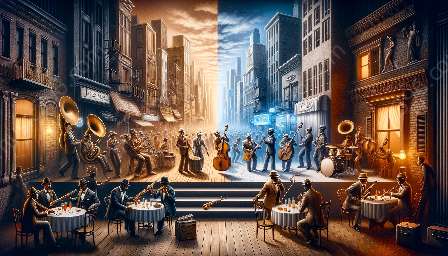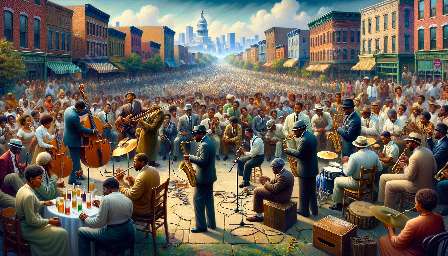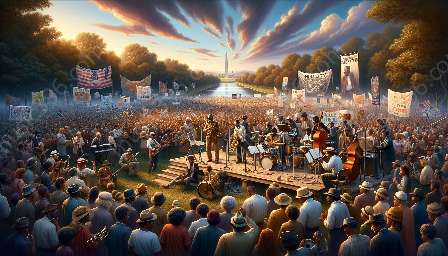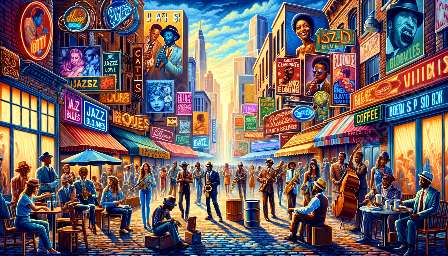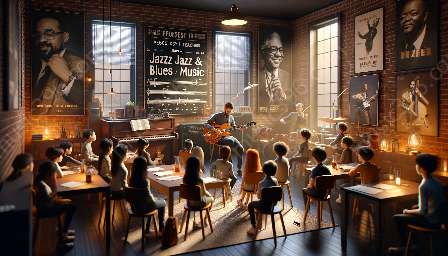Music has always been a powerful tool for challenging stereotypes and promoting racial equality, and the genres of jazz and blues have played a significant role in this pursuit. This topic cluster will explore the historical and cultural significance of jazz and blues in African American culture, as well as their impact on challenging racial stereotypes and fostering greater equality. By examining the influence of jazz and blues on social change and their contribution to shaping the African American experience, we can gain a deeper understanding of the transformative power of music in promoting racial harmony and challenging prejudice.
Historical Roots of Jazz and Blues
Jazz and blues music both have deep roots in African American culture, emerging from the experiences of enslaved Africans and their descendants in the United States. The blues, with its emotional lyrics and soulful melodies, can be traced back to the African American experience of oppression, hardship, and resilience. Jazz, on the other hand, originated in the vibrant cultural landscape of New Orleans and evolved as a mix of African and European musical traditions.
Both genres became powerful forms of artistic expression for African Americans, providing a means to channel their experiences, emotions, and struggles. Jazz and blues musicians often used their music to tell stories of injustice, discrimination, and the enduring spirit of their community, laying the groundwork for the genres' future role in challenging stereotypes and promoting racial equality.
Challenging Stereotypes through Music
One of the most significant ways jazz and blues have challenged stereotypes is by offering a counter-narrative to prevailing racial prejudices. Through their music, African American artists have been able to convey the richness of their culture, showcase their creativity and talent, and defy demeaning stereotypes perpetuated by mainstream society.
By asserting their humanity and dignity through their art, jazz and blues musicians have challenged the notion that African Americans are inferior or limited in their abilities. Their music has served as a form of resistance against the dehumanization and marginalization of their community, inspiring pride and empowerment among listeners while dismantling negative stereotypes.
Promoting Racial Equality and Unity
Jazz and blues have also played a pivotal role in promoting racial equality and fostering unity. These genres have provided a platform for cultural exchange, collaboration, and solidarity, transcending racial barriers and bringing people together through the universal language of music. Jazz, in particular, has been celebrated as a genre that embraces diversity, improvisation, and individual expression, reflecting the values of freedom and equality.
Moreover, the integration of jazz and blues into the mainstream music scene has helped to break down racial segregation and elevate African American voices and perspectives. By gaining recognition and respect in the music industry, jazz and blues musicians have contributed to the dismantling of racial divides and opened doors for greater inclusivity and understanding.
Legacy and Impact
The legacy of jazz and blues in challenging stereotypes and promoting racial equality continues to resonate in contemporary American society. These genres have left an indelible mark on the cultural landscape, influencing other forms of music and inspiring social movements that advocate for racial justice and equality.
The enduring influence of jazz and blues can be seen in the work of artists who continue to draw from these traditions to address issues of race, identity, and belonging. By embracing the legacy of jazz and blues, contemporary musicians and enthusiasts carry forward the spirit of resilience, creativity, and social consciousness that has defined these genres for generations.
Conclusion
Jazz and blues have been pivotal in challenging stereotypes and promoting racial equality within African American culture. These musical genres have served as powerful vehicles for expressing the experiences, aspirations, and resilience of the African American community. By honoring the historical and cultural significance of jazz and blues, we can recognize their enduring impact on promoting racial harmony, breaking down barriers, and shaping a more inclusive and equitable society.

